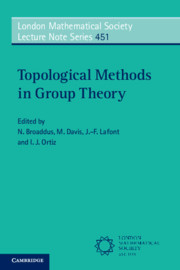Book contents
- Frontmatter
- Contents
- Contributors
- Preface
- 1 Left Relatively Convex Subgroups
- 2 Groups with Context-free Co-word Problem and Embeddings into Thompson’s Group V
- 3 Limit Sets for Modules over Groups Acting on a CAT(0) Space
- 4 Ideal Structure of the C∗-algebra of R. Thompson’s group T
- 5 Local Similarity Groups with Context-free Co-word Problem
- 6 Compacta with Shapes of Finite Complexes: a Direct Approach to the Edwards–Geoghegan–Wall
- 7 The Horofunction Boundary of the Lamplighter Group L2 with the Diestel–Leader metric
- 8 Intrinsic Geometry of a Euclidean Simplex
- 9 Hyperbolic Dimension and Decomposition Complexity
- 10 Some Remarks on the Covering Groups of a Topological Group
- 11 The Σ-invariants of Thompson’s group F via Morse Theory
2 - Groups with Context-free Co-word Problem and Embeddings into Thompson’s Group V
Published online by Cambridge University Press: 27 August 2018
- Frontmatter
- Contents
- Contributors
- Preface
- 1 Left Relatively Convex Subgroups
- 2 Groups with Context-free Co-word Problem and Embeddings into Thompson’s Group V
- 3 Limit Sets for Modules over Groups Acting on a CAT(0) Space
- 4 Ideal Structure of the C∗-algebra of R. Thompson’s group T
- 5 Local Similarity Groups with Context-free Co-word Problem
- 6 Compacta with Shapes of Finite Complexes: a Direct Approach to the Edwards–Geoghegan–Wall
- 7 The Horofunction Boundary of the Lamplighter Group L2 with the Diestel–Leader metric
- 8 Intrinsic Geometry of a Euclidean Simplex
- 9 Hyperbolic Dimension and Decomposition Complexity
- 10 Some Remarks on the Covering Groups of a Topological Group
- 11 The Σ-invariants of Thompson’s group F via Morse Theory
Summary
Let G be a finitely generated group, and Σ a finite subset that generates G as a monoid. The word problem of G with respect to Σ consists of all words in the free monoid Σ* that are equal to the identity in G. The co-word problem of G with respect to Σ is the complement in Σ* of the word problem. We say that a group G is coCF if its co-word problem with respect to some (equivalently, any) finite generating set Σ is a context-free language. We describe a generalized Thompson group V(G,θ) for each finite group G and homomorphismθ: G → G. Our group is constructed using the cloning systems introduced by Witzel and Zaremsky. We prove that V(G,θ) is coCF for any homomorphism θ and finite group G by constructing a pushdown automaton and showing that the co-word problem of V(G,θ) is the cyclic shift of the language accepted by our automaton. Demonstrative subgroups of V, introduced by Bleak and Salazar-Diaz, can be used to construct embeddings of certain wreath products and amalgamated free products into V. We extend the class of known finitely generated demonstrative subgroups of V to include all virtually cyclic groups.
- Type
- Chapter
- Information
- Topological Methods in Group Theory , pp. 19 - 37Publisher: Cambridge University PressPrint publication year: 2018



